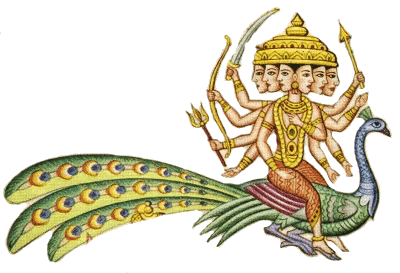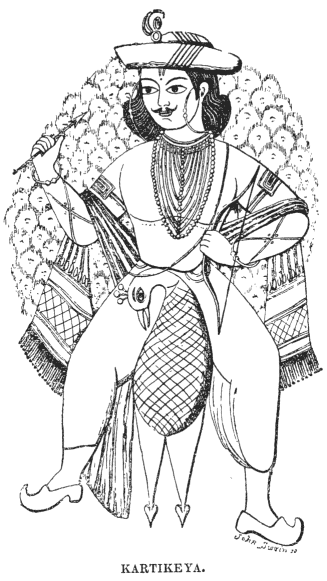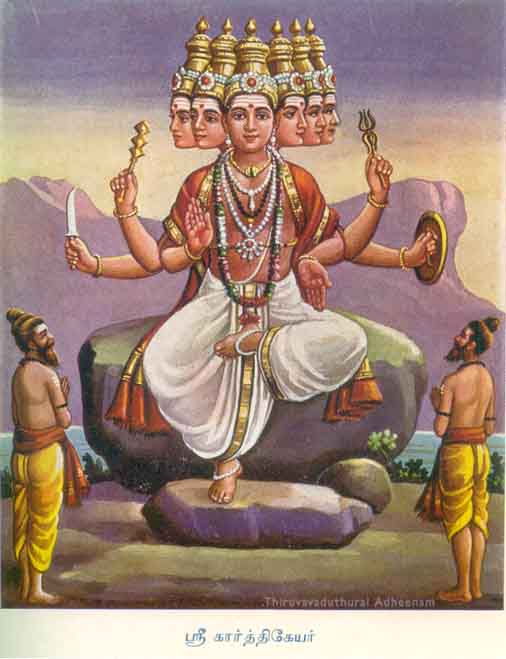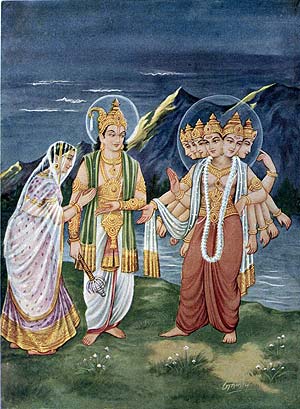
|
|||
|
| |||
Kārttikeyafrom Hindu Mythology, Vedic and Puranic, by W.J. Wilkins, [1900], pp. 335-341
Kārttikeya, the god of war, and generalissimo of the armies of the gods, though called the younger son of Siva and Parvati, according to most of the Puranic legends, is their son only in the sense that they formed him. Brahmā arranged for his birth in answer to the prayers of the gods for a competent leader of their forces. The Rāmāyana says: "While Siva, the lord of the gods, was performing austerities, the other deities went to Brahmā and asked for a general in the room of Mahādeva, who, it seems, had formerly acted in that capacity. 'He,' said they, 'whom thou didst formerly give as a leader of our armies (Mahādeva), is now performing great austerities, along with Umā.' Brahmā says that in consequence of the curse of Umā no son could be born of any wives of the gods, but that Agni should have a son by the river Gangā, who should be their general." In the following extract from the Mahābhārata is an explanation of the statement in the preceding paragraph that Agni was to be the father of this god. Kārttikeya has just been installed as general, when, "the god whose banner is a bull (Siva), arriving with his goddess, paid him honour, well pleased. Brāhmans called Agni Rudra, consequently he (Kārttikeya) is the son of Rudra. Having seen him thus honoured by Rudra, all the deities consequently call him, who is the most excellent of the gifted, the son of Rudra. For this child was produced by Rudra when he entered into fire. Skanda (Kārttikeya), that most eminent deity, being born of Agni, [who was] Rudra, and from Svāhā (Umā) [and] the six wives [of the Rishis], was the son of Rudra." 
This quotation will be more intelligible after reading what precedes it: "Indra being distressed at the defeat of the armies of the gods by the Dānavas, is meditating on this subject, when he hears the cry of a female calling for help, and asking for a husband to protect her. Indra sees that she has been seized by the demon Kesin, with whom he remonstrates; but the demon hurls his club at Indra, who, however, splits it with his thunderbolt. Kesin is disabled in the next stage of the combat, and goes off. Indra then finds out from the female that her name is Devasenā (army of the gods), that she has a sister named Daityasenā (army of the daityas), and that they are both daughters of Prajāpati. She wishes Indra to find her a proper husband, who shall be able to overcome the enemies of the gods. Indra takes Devasenā with him to Brahmā, and desires him to provide her with a martial husband; and Brahmā promises that a helpmate of that description shall be born. It happened that Vasishtha and other Rishis had been offering a sacrifice, whither the gods, headed by Indra, proceeded to drink the Soma juice. Agni, too, being invoked, descended from the region of the sun, entered into the fire, received the oblations of the Rishis, and presented them to the gods. 
"Issuing forth [from the fire], he beheld the wives of these great [Rishis] reclining in their own hermitages, and sweetly sleeping, resembling golden altars, pure as beams of the moon, like to flames of fire, all wonderful as stars. Perceiving that his senses became agitated, beholding the wives of the Rishis, Agni was overcome with desire. Again and again he said, 'It is not proper that I should be thus agitated; they are not in love with me. Entering into the domestic fire, I shall gaze upon them close at hand.' Entering the domestic fire, touching, as it were, with his flames, all of them, and beholding them, he was delighted. Dwelling thus there for a long time, fixing his attention on these beautiful women, and enamoured of them, Agni was overcome. "Agni failing to obtain the Brāhmans' wives, resolved to abandon his corporeal form, and went into the forest. Then Svāhā, the daughter of Daksha, first fell in love with him. This amorous and blameless goddess for a long time sought for his weak point, but could not find any. But being aware that he had gone into the wood, and that he was really disturbed by desire, the amorous goddess thus reflected: 'I, who am distressed with love, will take the forms of the seven Rishis' wives, and will court the affection of Agni. By doing so he will be pleased, and I shall obtain my desire.' Assuming first the form of Siva, the wife of Angiras, the handsome goddess went to Agni, and thus addressed him: 'Agni, thou oughtest to love me, who am disturbed with love for thee; if thou wilt not do so, look upon me as dead. Agni, I, Siva, the wife of Angiras, have come, sent by virtuous women.' Agni replied: 'How dost thou, and how do the other beloved wives of the seven Rishis, know that I am distressed with love?'" Agni was not able to resist the temptation. After the interview, lest the wives of the Rishis should be blamed for their misconduct if she happened to be seen in their form, she assumed the figure of Garuda, the bird of Vishnu, and unnoticed, as she thought, flew from the forest. She visited Agni a second time, as the wife of another Rishi, and so on until she had paid six visits. The germs obtained from Agni she deposited in a golden reservoir, which, "being worshipped by the Rishis, generated a son. Kumāra (Kārttikeya) was born with six heads, a double number of ears, twelve eyes, arms, and feet, one neck and one belly. 
"Kārttikeya marries Devasenā. The six Rishis’ wives, his mothers, afterwards come to him, complaining that they had been abandoned by their husbands, and degraded from their former positions, and asking him to secure their admission into paradise (Swarga). When Skanda had done what was gratifying to his mothers, Svāhā said to him, 'Thou art my genuine son. I desire the love difficult to obtain which thou givest.' Skanda then asked her, 'What love dost thou desire?' Svāhā replied, 'I am the beloved daughter of Daksha, by name Svāhā. From my childhood I have been enamoured of Agni; but, my son, Agni does not thoroughly know me, who am enamoured of him.' Skanda replied, 'Whatever oblation of Brāhmans is introduced by hymns, they shall always, goddess, lift and throw it into the fire, saying Svāhā (happiness). Thus, O beautiful goddess, Agni shall dwell with thee continually." Then Brahmā Prajāpati said to Skanda, Go to thy father Mahādeva, the vexer of Tripura. Thou, unconquered, hast been produced for the good of all worlds by Rudra, who had entered into Agni, and Umā, who had entered into Svāhā.'" The allusion to Rudra's entering into Agni is explained in the Rāmāyana. The gods, fearing that the descendants of such a pair as Siva and Pārvati would be too dreadful to live with, entreated those deities not to have offspring. Siva consented, but Umā, being angry, declared that as she could not have children the other goddesses should suffer similar deprivation. Unfortunately, the gods came too late to prevent the production of Kārttikeya; the germ from which he was born having been received by the earth. Agni and Vāyu entered it, and deposited it with Gangā, the sister of Umā, and thus this deity was produced. The "Siva Purāna" gives a different account of his origin, and teaches that he was produced to effect the destruction of Tārika. This demon, who was King of Tripura, was " exceedingly ambitious and oppressive. He forced Brahmā, by his penance and austerities, to promise him any boon that he should demand. Among his austerities he went through the following series, each of the eleven specific mortifications continuing 100 years:
"Such merit was irresistible, and Indra and a host of demi-gods, alarmed lest their sovereignty should be usurped through the potency of this penance, resorted to Brahmā for consolation. Brahmā, however, said that, although he could not resist such austerities, he would, after rewarding them by granting the boon demanded, devise a method of rendering it ultimately inoffensive to them. "The demand by Tārika was that he should be unrivalled in strength, and that no hand should slay him but that of a son of Mahādeva. He now became so arrogant that Indra was forced to yield to him the white eight-headed horse Ukhisrava; Kuvera gave up his thousand sea-horses; the Rishis were compelled to resign the cow Kāmdhenu, that yielded everything that could be wished. The Sun in dread gave no heat, and the Moon in terror remained always at full. The Winds blew as he dictated, and, in short, he usurped the entire management of the universe. "Nārada prophesied the marriage whence should arise the deliverer of the world; but at first Mahādeva could not be influenced with the passion of love. Indra persuaded Kama to lie in ambush, and contrived that Pārvati should be seen by Siva while engaged in the amiable and graceful act of gathering flowers, wherewith to decorate his image. Kāma, accompanied by his wife Rati (Desire), and his bosom friend Vasantu (the Spring), took his aim, and launched an arrow at Mahādeva, who, enraged at the attempt (to interrupt his devotion), reduced Kāma to ashes by a beam of fire that issued from his third eye. At length, however, by ardent devotion and austerities, Pārvati propitiated Siva, and the deity consented to espouse his persevering devotee." For some time after their marriage, as there was no child born to them, the distressed and disappointed deities who had been anxiously expecting a deliverer, renewed their lamentations and complaints. "Agni arrived in the presence of Mahādeva, having been deputed to express the desires of the other gods, that he would provide them with a son, who should destroy Tārika. Siva had just left his wife, and Agni, assuming the form of a dove, received from Mahādeva the germ from which Kārttikeya arose. Unable to carry it further, he let it fall into the Ganges, on the banks of which river arose a boy, beautiful as the moon, and bright as the sun, who was called Agnibhuva (produced from Agni), Skanda, Kārttikeya, etc. "It happened that six daughters (the Pleiades) of as many Rajas, coming to bathe, saw the boy, and each called him her son; and, offering the breast, the child assumed to himself six mouths, and received nurture from each; whence he is called Sasthimātriya (having six mothers). But in fact the child had no mother, for he came from his father alone. In course of time a conflict ensued between Kārttikeya and Tārika, in which the demon was slain." A story is told showing how Kārttikeya was outwitted by his brother Ganesa. As the two brothers fell in love with two ladies named Siddhi and Buddhi, it was agreed that whoever first travelled round the world should have them. Ganesa proved by his logical talents and aptness at quotation that he had done this, and obtained the prize long before his brother returned from his weary pilgrimage, to the disquiet of both families when Ganesa's sophistry was discovered. We have still another account * of the origin of Kārttikeya: "Siva emitted sparks of fire from his eyes, which, being thrown into the lake Saravana, became six infants, who were nursed by the wives of the Rishis, who are seen in the sky as the Pleiades. When Pārvati saw these children, she was transported with their beauty, and embraced all of them together so forcibly that their six bodies became one; while their six heads and twelve arms remained." Kārttikeya is better known in South India under the name of Subrahmanya. The Skanda Purāna gives a full account of his war with Sura, and relates how he was sent by his father to interrupt Daksha's sacrifice; and how, at the instigation of the latter, he was delayed on his journey by beautiful damsels, who entertained him with dance and song. Hence it is the practice for dancing girls, who are attached to the pagodas, to be betrothed and married to him; and, though allowed to prostitute themselves, cannot marry any one. |